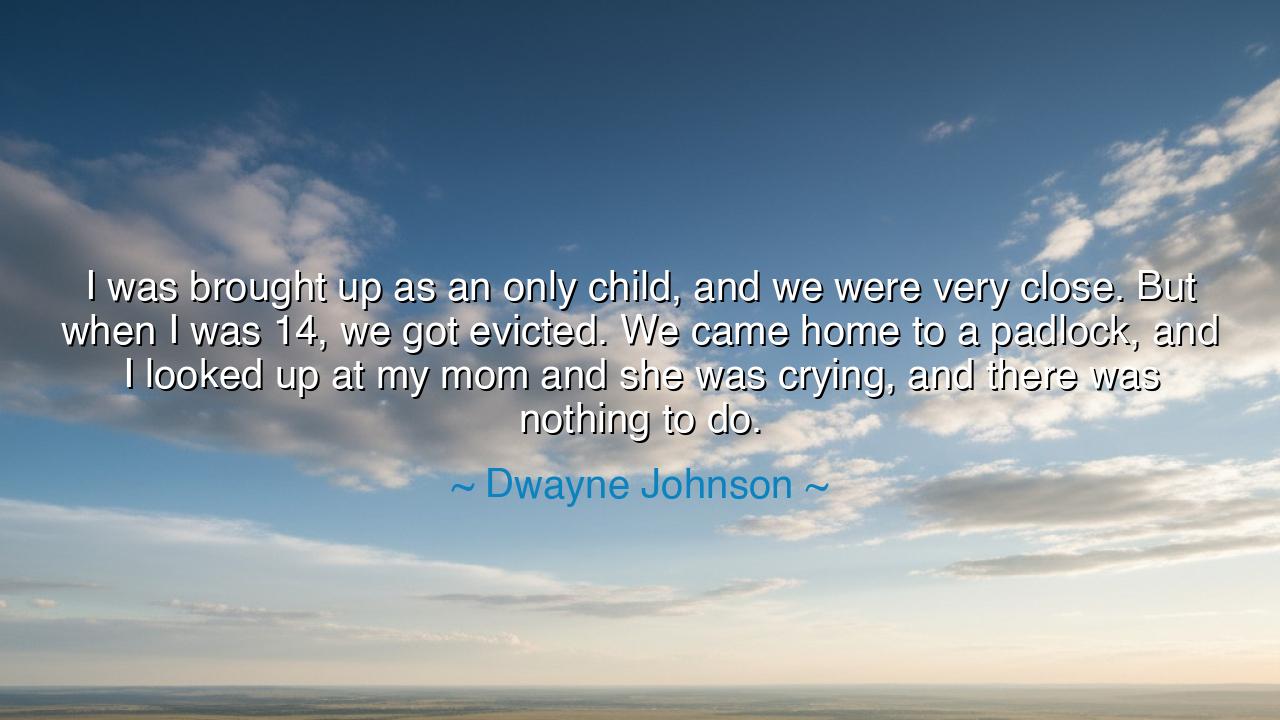
I was brought up as an only child, and we were very close. But
I was brought up as an only child, and we were very close. But when I was 14, we got evicted. We came home to a padlock, and I looked up at my mom and she was crying, and there was nothing to do.






In the raw and haunting words of Dwayne Johnson, we find a moment carved from the stone of suffering: “I was brought up as an only child, and we were very close. But when I was 14, we got evicted. We came home to a padlock, and I looked up at my mom and she was crying, and there was nothing to do.” These are not the words of a man recalling wealth or triumph — they are the confession of one who learned the meaning of humility, helplessness, and endurance. Beneath their pain lies a seed of wisdom that all must someday confront: that life, in its harshest hours, tests not what we possess, but what we are made of.
In this memory, the Rock is not yet the towering figure of strength and success known across the world. He is a boy — vulnerable, watching his world collapse in silence, seeing his mother weep before the cold face of circumstance. The padlock, that small and merciless object, becomes the symbol of loss — the shutting out of security, the end of childhood innocence, the beginning of awareness that even love cannot always shield us from the storms of life. The image is simple, yet timeless: a door once open now sealed, a mother’s tears falling where no comfort can reach. And yet, within this very pain was planted the strength that would one day define him.
The ancients would have recognized this moment as a rite of passage, a crucible through which the soul must pass to discover its own fire. Every great life is marked by a moment of despair — a point where all seems lost, and one stands before the void. For Dwayne Johnson, this eviction was such a moment. Stripped of home and certainty, he learned that the foundations of strength are not built upon possessions, but upon resilience and unity. He could not help his mother that day, but he could remember — and in remembering, he could vow to rise. The young boy standing before that padlocked door became the man who would one day unlock doors for millions — through his perseverance, his discipline, his light.
In history, we see echoes of this truth. Consider the story of Abraham Lincoln, who as a boy lost his mother in poverty and grew up working with his hands in the wilderness. He had little education, little comfort, yet from those early struggles came a heart tempered with compassion and a mind sharpened by endurance. When he faced the great darkness of his nation’s division, he carried with him the strength that only suffering can teach. Like Johnson, Lincoln’s early pain became his teacher. From humility was born greatness, from helplessness — purpose.
The quote also reveals a deeper bond — that between mother and child. When Dwayne Johnson speaks of looking up to see his mother cry, we glimpse not only his pain but the origin of his empathy. The ancients revered the mother as the first temple, the guardian of the spirit. To see her in tears is to see the world itself wounded. Yet that sorrow often becomes the source of a child’s fire. Many of history’s strongest souls have drawn their courage from the sight of their mothers’ sacrifices. For when love suffers, duty awakens. From that moment onward, Johnson’s journey was not merely his own; it was a promise — to never again let despair win, to honor his mother’s tears with triumph earned through discipline and hope.
The padlock on the door also carries a spiritual truth. It reminds us that doors close not only to end things, but to redirect us. Every loss, every failure, every exile from comfort can become a doorway to transformation — if we do not surrender to bitterness. The Stoics taught that we cannot control fortune, but we can control our response to it. Young Dwayne, though powerless in that moment, chose not to drown in sorrow. He carried that memory forward like a spark, using it to fuel a lifetime of ambition, service, and gratitude. His story is proof that from despair can rise discipline, and from brokenness, belief.
The lesson, then, is both simple and eternal: the greatest trials often hide the seeds of our future strength. When hardship strikes — when the world locks its doors before you — do not curse the lock. Instead, build the key within yourself. Let suffering refine, not destroy. Let pain deepen your compassion rather than your anger. Like Dwayne Johnson, turn the memory of helplessness into a vow of purpose. For those who endure without surrender, even the heaviest burdens become the stones upon which their legacy is built.
So, dear listener, remember the image of the boy and his mother before the locked door. We all stand there, at some point in life, before something we cannot change. But in that moment lies the choice that defines us: to yield or to rise. Let Dwayne Johnson’s memory be a beacon — that from loss comes strength, from tears comes resolve, and from closed doors comes the will to build new ones. For no lock can hold forever against the spirit that refuses to stop knocking.






AAdministratorAdministrator
Welcome, honored guests. Please leave a comment, we will respond soon